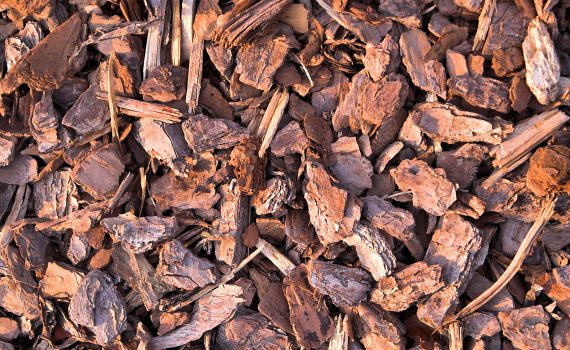Mulch is great for gardens, helping to retain moisture, protect plants and adding a decorative finish to your beds. Mulch can greatly improve the condition of your garden, replenish the soil and keep your garden neat and maintained. But when it comes to mulching your garden, wood mulch is not the only option. There are many choices of material for mulch, but two of the most common and popular are bark or wood mulch and rock mulch. Both of these mulch types perform the essential functions of retaining moisture in soil and keeping the soil insulated. Here we look at the difference between these two mulch types and which is better for your garden beds.
Bark or Wood Mulch
Bark and wood mulch are organic mulch types that are made from shredded bark or wood. Wood and bark mulch are naturally brown or black, however they can be dyed a variety of colors to match your tastes. Bark and wood mulches are available from professional arborists, who obtain the mulch from healthy trees. Natural wood or bark mulch has an appearance like wood chips or small pieces of bark. It also releases a natural earthy smell when placed on your garden.
One of the most significant and distinctive benefits of wood and bark mulch is that it decomposes and adds nutrients and nitrogen to your soil. Wood and bark mulch is also inexpensive, has a more natural appearance, and looks great in every garden bed. Wood and bark mulch effectively form a preventative barrier against weed growth and help avoid the need for edging material. Wood and bark mulch are also relatively soft and make it easy to garden even with the mulch covering.
However, there are also some disadvantages of wood and bark mulch. One of the most significant disadvantages is that wood and bark mulch needs to be replaced every 1 to 2 years as the mulch breaks down or is washed away. The vibrant color of wood and bark mulch can also fade in sunlight. Wood and bark mulch can potentially draw in pests and insects attracted to the small, broken pieces of wood.
Rock Mulch
Rock mulch offers a polished and flawless coverage for your garden beds. Rock mulch consists of any type of stones or gravel used to provide cover and protection for garden beds. The size of the rocks can range from very small to as large as a fist, and rock mulch is available in a variety of colors.
One of the greatest benefits of rock mulch is that it does not need to be replaced as often as wood and bark mulch. Rock mulch is hardy and won’t wash away or decompose. Rock mulch can also be ideal for sloped gardens as it holds its position well.
Rock mulch is much more expensive than wood and bark mulch, but it also lasts longer. While rock mulch doesn’t decompose, it may wear thin overtime, and you will need to find the same rock type and color to replace your coverage. One of the disadvantages of rock mulch is that weeds can grow through the gaps in the rock especially if organic matter and debris is allowed to collect on the surface of the rock mulch. Rock mulch is also heavy and difficult to remove if you change your mind or decide to add or take away plants from your garden.
Which Is The Best Choice For You?
Choosing the right mulch type for your garden beds depends on the type of plants you have and the look you’re going for. For plants that need extra nourishment, stable soil temperatures, and potentially moving or replanting, wood or bark mulch is best. if your plants can withstand higher soil temperatures and require less nutrients and nitrogen in the soil, rock mulch may be the best choice for you.
Having a local arborist inspect and analyze your garden bed and plants can help you identify the right mulch choice for you .
 Bringing Sexy Back Into Your Yards
Bringing Sexy Back Into Your Yards 
